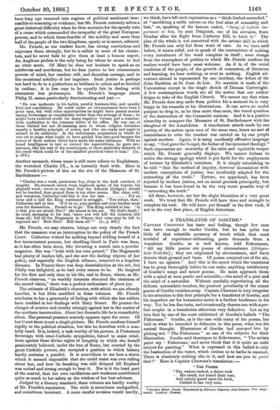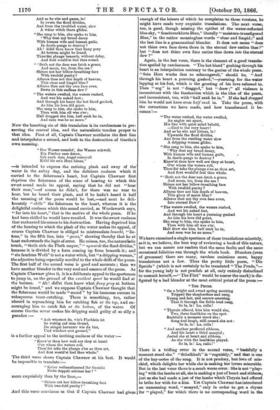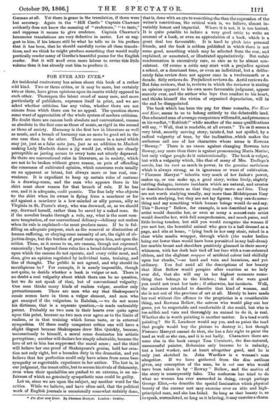A TRANSLATOR OF GOETHE.*
CAPTAIN CHAWNER has taste and feeling, though few men can have enough to render Goethe, but he has quite too little of that scientific accuracy of touch which that most truthful of experience-delineating poets demands from a translator. Goethe, as is well known, told Eckermann, "All my little poems are poems of circumstance [Gelegen- heits Gedichte] ; they are originated by circumstance, and have therein their ground and basis. Of poems conjured out of the air, I have no opinion." And this is the secret which the translator has to grasp thoroughly before he can make anything satisfactory of Goethe's songs and minor poems. He must approach them with a mind at once poetic and scientific,—the mind of a poet and the mind of a naturalist. Without carefully reproducing all the delicate naturalistic touches, the poetical peculiarity of the minor poems of Goethe vanishes away. Captain Chawner is very irregular in his attention to this first principle for a translator of Goethe, and his imperfect ear for hexameter metre is a further hindrance in his way. Yet he has fine taste, and occasionally charms one with a per-
fect couplet in a translation otherwise very defective. Let us try him first by one of the most celebrated of Goethe's ballads "The Fisherman." Goethe, as is the case with many of his poems, has told us what he intended to delineate in this poem, what was his central thought. Illustrators of Goethe had annoyed him by picking out "The Fisherman" as one of the subjects for their illustration. Goethe said thereupon to Eckermann, "The artists paint my Fisherman,' and never think that it is quite an unfit subject for painting." What is expressed in this ballad is only the fascination of the water, which entices us to bathe in summer. There is absolutely nothing else in it, and how are you to paint that?" Here is Captain Chawner's translation :—
" Tux FIBRE& "The waters rushed, a fisher took
• His stand, nor heard their roar, And calmly gazed upon his hook, Chilled to the very core.
• Goethe's Minor Poems. Tranrdated by Edward Chawner (late Captain 77th Regi- ment). London: Pitman.
And as he dits and gazes, lo! In twain the flood divides, And from the troubled water, slow A'ailiter witch there glides.
"She sang to hit; she spake to him, 'Why dost ruy brood decoy With human wile and human guile, In death-pangs to destroy ? Au! didst thou know that finny prey At bottoni might be found, Thoadst plunge beneath, without delay, And first would'at feel thee sound.
" Doth not the dear sun fetch a grace, And moon, too, from the sea ?
ShineS not het billow-breathing face With twofold purity? Allures thee not this depth of heaven, This clear and limpid blue ? Allures thee not thy own face even, Dotirn in this endless dew ?'
"The *stein swelled, the waters rushed, And wet his naked feet ; And through his heart the hot blood gushed, As him his love did greet.
She sang to him, she spake to him, Then with him all was o'er ; Half dragged she him, half sank he in, And seen was he no more."
Now the besetting sin of this translation is its carelessness in pre- serving the central idea, and the naturalistic touches proper to that idea. First of all, Captain Chawner mutilates the first line and interpolates a seeond, and both to the destruction of Goethe'a own meaning.
"Dan Wasser rauseht', das Waster schwoll,
Din Fischer sass daran, Sah nach dem Angel ruhevoll Kuhl his an's Herz hinan,"
—is intended to express the enticing plash and sway of the water in the sultry day, and the delicious coolness which it carried to the fisherman's heart, but Captain Chawner first deprives the fisherman of the sense of hearing to which this sweet 'sound made its appeal, saying that he did not "hear their roar,"—of course he didn't, for there was no roar to hear, but he heard their plash, and if he hadn't heard it half the meaning of the poem would be lost,—and next he deli- berately " chills " the fisherman to the heart, whereas it is the delightful coolness which this sound carried, as Wordsworth says, 4' far into his heart," that is the motive of the whole poem. If he had been chilled he would have recoiled. It was the sweet coolness that enchanted his senses to his destruction. Having deprived him of-the hearing to which the plash of the water makes its appeal, of course Captain Chawner is obliged to mistranslate lauscht, "lis- tens," in the fifth line, into "gazes," showing thereby that he at least understands the logio of error. He misses, too, the naturalistic touch, "theilt sich die Fluth empor," "upwards the flood divides," because it is divided by a form coming up from beneath it ; and "em feuchtes Weib" is not a water witch, but "a dripping woman," the adjective being especially needful to the whole drift of the poem. The first half of the second verse is good and accurate ; then we have another blunder in the very soul and essence of the poem. As Captain Chawner gives it, it is a deliberate appeal to the sportsman to jump in, on the ground of the etcellent sport he would find at the bottom. " Ah ! &dist thou know what finny prey at bottom might be found," and we suppose Captain Chawner thought that the fisherman wo-nld be made " sound " by his immense success in subaqueous trout-catching. There is something, too, rather absurd in reproaching him for catching fish at the top, and en- couraging him to catch fish at the bottom, of the water. Of course Goethe never makes his dripping maid guilty of so silly a
paradox :--
" Aeh wiisstest du, wie's Fischlein 1st So wohlig ant dem Grund, Du stiegat hernnter 'ale du bist, Und wiirdest erst gesund,"
is a further appeal to the inviting coolness of the water :— "Knew'st thou how well are they at heart O'er whom the waters roll, Thou'dat take the plunge e'en as thou art, And first would'st feel thee -whole."
The third verse shows Captain Chawner at his best. It Would be impossible to translate :—
" Behrt wellenathmend ihr Gesicht Nicht doppolt schoner her ? "
snore exquisitely than by the lines,—
"Shines not her billow-breathing face With two-fold purity ?"
And this verse convinces us that if Captain Chawner had given enough of the leisure of which. he complains to these versions, he might have made very exquisite translations. The next verse, too, is good, though missing the epithet of the water-reflected blue sky, " feuchtverklarte Blau," literally" moisture-transfigured Blue," in. the rather meaningless words "clear and limpid ;" and the last line is a grammatical blunder. It does not mean "does not thine own face down there in the eternal dew entice thee ?"
but "does not thine own face entice thee down into the-eternal dew ?"
Again, in the last verse, there is the element of agood.transla- tion spoiled by carelessness. "The hot blood" gushing through his heart is an interpolation contrary to the genius of the whole poem. "Sent Herz WUCIlli ihm so sehnwigsvoll," should be, "And through his heart a yearning gushed,"—yearning for the water lapping at his feet, which is the greeting of his love referred to. Then " zog " is not "dragged," but " drew ;" all violence is inconsistent with the fascination which is the idea of the poem, and inconsistent, too, with "half sank he in." If she had dragged him he would not have even half sunk in. Take the poem, with the corrections we have made, and how transformed it be- cornea !—
" The water rushed, the water swelled, An angler sat apart, His line withquiet mind beheld, —Cool to the very heart ! And as he sits and listens, lo!
Upwards the flood divides, And from the rustling water slow A dripping woman glides.
"She sang to him, she spake to him, Why dost my brood decoy, With human wile and human guile, In death-pangs to destroy ? Hnew'st thou how well are they at heart,. O'er whom the waters roll, Thoadst take the plunge e'eaas thou art, And first would'et feel thee whole.
" Doth not the dear sun fetch a grace, And moon, too, from the sea ? Shines not her billow-breathing face With twofold purity ?
Allures thee not this depth of heaven, This glory of moist blue ?
Allures thee not thy own face even, Into eternal Dew 2'
"The waters swelled, the waters rushed,
And wet his naked feet, And through his heart a yearning gushed As him his love did greet, She sang to him, she spake to him, Then with him all was o'er, Half drew she him, half sank he in, And seen was he no more."
We have examined a single specimen of these translations minutely, as it is, we believe, the best way of reviewing a book of this nature, but we can assure our readers that the same faults and the same occasional felicities run through the whole book. Blunders (even of grammar) there are many, careless omissions more, happy translations not a few. Thus the pretty little poem, "Die SprOde " (which is not certainly to be translated "The Prude,"— for the young lady is not prudish at all, only entirely disinclined to -commit herself,—" The Flirt" would be nearer the mark) is dis- figured by a bad blunder at the most critical point of the poem :—
" PRUDE.
"On a bright and sweet spring morning Tripped the shepherdess and sang, Young and fair, and sorrow-scorning, That it through the fields loud rang, So la, la! La, rails!
" Thyrais offered, kiss him would she, Two, three lambkins on the spot. Bashfully a moment stood she ; Song and laugh, still ceased she not : So la, la! La, renal "And another proffered ribbons, And his heart a third assayed ; Jested she at heart and ribbons, As she with the lambkins played. So is, la! La, rale !"
There is a trifling error in the second verse, "bashfully a moment stood she." "Schalkhaft" is "roguishly," and that is one of the key-notes of the song. It is not prudery, but love of mils, chief, which delights her while she is making her lovers miserable. But in the last verse there is a much worse error. Shale not "play- ing" with the lambs at ail, she is making a jest of heart and ribbons, just as she had made a jest of the lambs which Thrysis had offered to bribe her with for a kiss. Yet Captain Chawner has introduced an unmeaning word, "assayed," only in order to get a rhyme for "played," for which there is no corresponding 'word in the
German at all. Yet there is grace in the translation, if there were but accuracy. Again hi the "Hilt Castle" Captain Chawner evidently does not know the meaning of " credenzen," "to taste," and supposes it means to give credence. Captain Chawner's hexameter translations are very defective in metre. Let us sug- gest to him, if his leisure still be what he tells us in his preface that it has been, that he -should carefully revise all these transla- tions, and we think he might produce something that would really poetically render many of Goethe's beautiful poems for the English reader. Bat it will need even more labour to revise this little volume than it hail already cost him to produce it.
































 Previous page
Previous page